Welcome to Remeday your go-to galaxy for diving deep into the magical world of psychedelic and medicinal mushrooms! 🍄✨
Are you ready to explore the tiny, yet mighty power of these fascinating fungi? Buckle up! We're embarking on a journey to the micro-world of microdosing, where less is definitely more, and small is seriously powerful.
In the sprawling universe of natural remedies and holistic healing, psychedelic mushrooms are emerging as a powerful pain remedy.
But wait—before visions of technicolor voyages have you floating in space, let's get down to Earth.
We're talking microdosing, the art of harnessing the power of psilocybin, bit by tiny bit, to navigate the cosmos of pain management without ever leaving orbit (so to speak).
If you're interested in learning about microdosing mushrooms for pain management you've come to the right place. We're a passionate group of shroom nerds who aren't here to sell you on anything. We just want to help you learn about medicinal and magic mushrooms without needing a medical degree.
So, are you ready to sprinkle a little magic into your life? Let's dive in to the magnificent world of microdosing mushrooms for pain management.
What are magic mushrooms?
Magic mushrooms, or psychedelic mushrooms, are mushrooms that contain the psychedelic compound known as psilocybin.
When consumed in low to moderate doses, these mushrooms can produce a variety of mind-expanding effects from intense hallucinations, new colors and sensations, a heightened sense of awareness, and so much more.
But you don't need to 'trip' on mushrooms to benefit from their medicinal potential. That's why microdosing has become so popular in the past few years.
What is mushroom microdosing?
Microdosing is a transformative practice that involves taking minuscule amounts of psychedelic substances—so small that they don't produce the full-blown psychedelic effects, but are just enough to influence the mind and body in subtle, yet profound ways.
Why do people microdose mushrooms?
There are several potential benefits to microdosing mushrooms with psilocybin. Many people like to microdose mushrooms to improve creativity, enhance focus and productivity, help with mental health and addiction, overall well-being, and of course, pain management.
.png?width=799&height=799&name=Benefits%20of%20Microdosing%20(2).png)
Do magic mushrooms help with pain?
The potential of magic mushrooms, particularly those containing psilocybin, to help with pain is an area of growing interest and research within the scientific community. Psilocybin is a psychoactive compound that, when ingested, is converted to psilocin, which then exerts effects on the brain, notably by influencing serotonin receptors. This can lead to altered perception, mood, and cognition.
Recent studies and anecdotal evidence suggest that psilocybin may have potential benefits for pain management, including chronic pain conditions.
But how does it work, exactly?
The truth is: there is so much we still don't fully understand about how medicinal and magic mushrooms work. And the mechanisms through which psilocybin could alleviate pain are not yet fully understood.
But here's what early research suggests:
The benefits of psychedelics for pain come from a combination of both psychological and neurological effects.
Some theories propose that psilocybin may help to "reset" the neural networks associated with certain types of pain, reduce inflammation, or change the way the brain perceives pain.
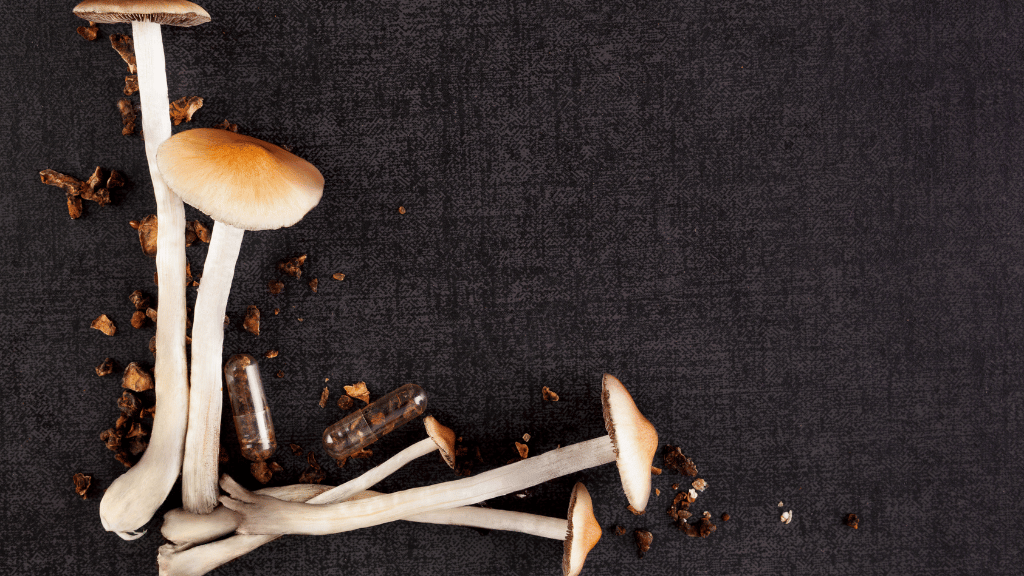
How microdosing mushrooms helps with pain
Microdosing psilocybin, which involves taking small, sub-hallucinogenic doses of the psychedelic compound found in certain mushrooms, has shown promise in helping manage pain, as evidenced by various discussions and studies highlighted in this thread. Here's how microdosing psilocybin may help with pain:
1. Microdosing may help manage chronic pain
Studies and patient testimonials suggest that psilocybin can significantly reduce chronic pain, including neuropathic pain and conditions like complex regional pain syndrome. This effect has been observed in individuals who have not found relief through traditional pain management methods, including pharmaceutical analgesics which can have adverse effects and a risk of addiction (as discussed in the context of Dr. Maria Maiarù's research and patient experiences from UCSD).
2. Microdosing may improve mental health associated with pain
Psilocybin's potential to rapidly reduce symptoms of depression and anxiety, conditions often comorbid with chronic pain, can indirectly contribute to pain management. Improving an individual's mental state may alter their perception of pain or enhance their capacity to cope with it.
The positive reframing and increased somatic presence reported by individuals engaging in microdosing practices suggest that the compound's benefits extend beyond mere symptom relief to potentially transforming an individual's relationship with their pain.
3. The mechanisms of psilocybin may help aid with pain relief
The underlying mechanisms by which psilocybin aids in pain relief are believed to involve its action on serotonin receptors and the induction of neuroplastic changes in the brain. These changes may modulate pain perception pathways and brain regions associated with chronic pain. Research, like that planned by Dr. Maiarù, aims to further elucidate these mechanisms, particularly comparing psilocybin's effects to those of antidepressants in animal models.
4. Microdosing may provide sustained pain relief over time
Patients have reported significant pain relief from doses of psilocybin that do not induce a full psychedelic experience, suggesting the potential for managing pain without disrupting daily activities. The absence of rebound pain or withdrawal symptoms on non-dosing days further underscores the therapeutic potential of psilocybin for chronic pain management.
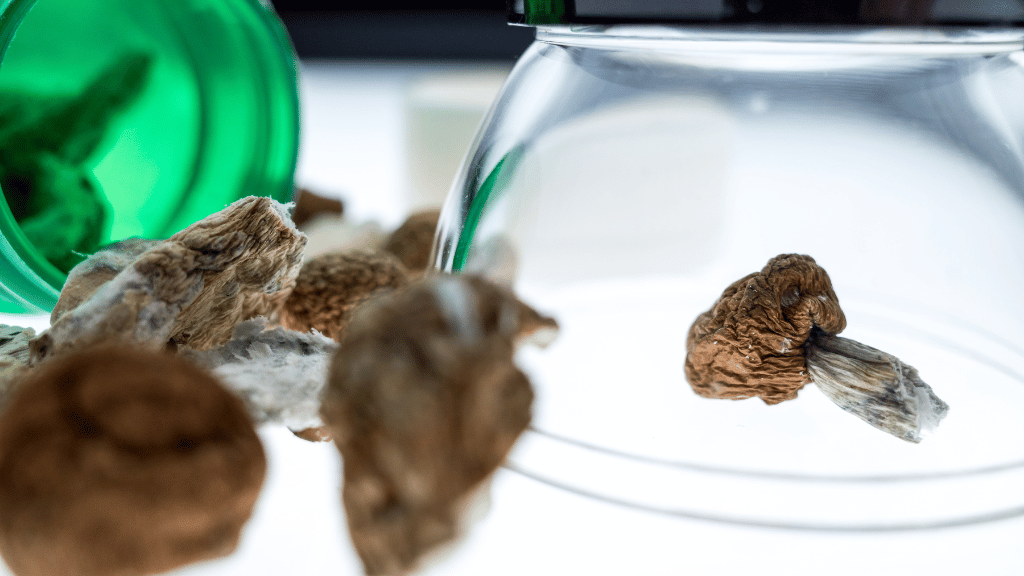
5. Microdosing may help improve the effects of traditional therapies
Anecdotal evidence indicates that the benefits of microdosing psilocybin for pain management can be amplified when combined with other therapies, such as mindfulness, breathwork, and functional exercise. This holistic approach might enhance the compound's efficacy and support overall well-being.
6. Psychedelic mushrooms may improve neuroplasticity
Microdosing mushrooms can promote neuroplasticity by stimulating growth and connectivity of neurons in the brain, similar to the effects observed with psychedelics in the prefrontal cortex, which is crucial for mood and cognitive functions.
This enhanced neuroplasticity could lead to improved functionality of brain areas involved in pain perception, potentially altering the way pain is processed and experienced.
By increasing synapse number and function through pathways like TrkB, mTOR, and 5-HT2A, microdosing mushrooms may offer a novel approach to mitigating chronic pain by directly influencing the brain's adaptability and response to pain signals.
7. Microdosing may alter your perception of your pain
Psilocybin can alter the way individuals perceive their environment and themselves, which may include a changed perception of pain.
While significant changes in perception are predominately seen with larger doses of psilocybin and guided through psilocybin therapy, individuals may notice a difference even at micro doses.
By altering the subjective experience of pain, individuals may find their pain less distressing or debilitating. Especially if that pain is chronic.
8. Microdosing may improve your mood
Psilocybin can have profound effects on mood, which is significant because chronic pain is often associated with psychological conditions such as depression and anxiety.
One analysis found that 26.6% of microdose users were using microdosing to improve mood as a primary benefit.
"Nine-tenths of respondents endorsed that microdosing improved their mood, which is in agreement with improved mood being the most commonly reported benefit-category. Anxiety improvement was also notable with 59% of respondents indicating this benefit. These rates of reported improvement suggest future research into microdosing for mood and anxiety may be warranted, complementing the recent work treating depression and anxiety with psilocybin." SOURCE
Improving these conditions might indirectly affect the experience of pain.
9. Microdosing for migraines and cluster headaches
Microdosing psychedelics, like psilocybin and LSD, may help with migraines and cluster headaches by modulating the serotonin system, a common pathway implicated in the pathophysiology of these headache disorders.
Individuals seeking alternatives due to the resistant nature of their headaches have reported significant relief from both the frequency and intensity of their episodes with microdosing, without experiencing the full psychedelic effects or severe adverse events.
This therapeutic potential is underscored by personal accounts from online forums, where sufferers share their positive outcomes, suggesting that microdosing could offer a promising avenue for those struggling with traditional treatment-resistant headache disorders.
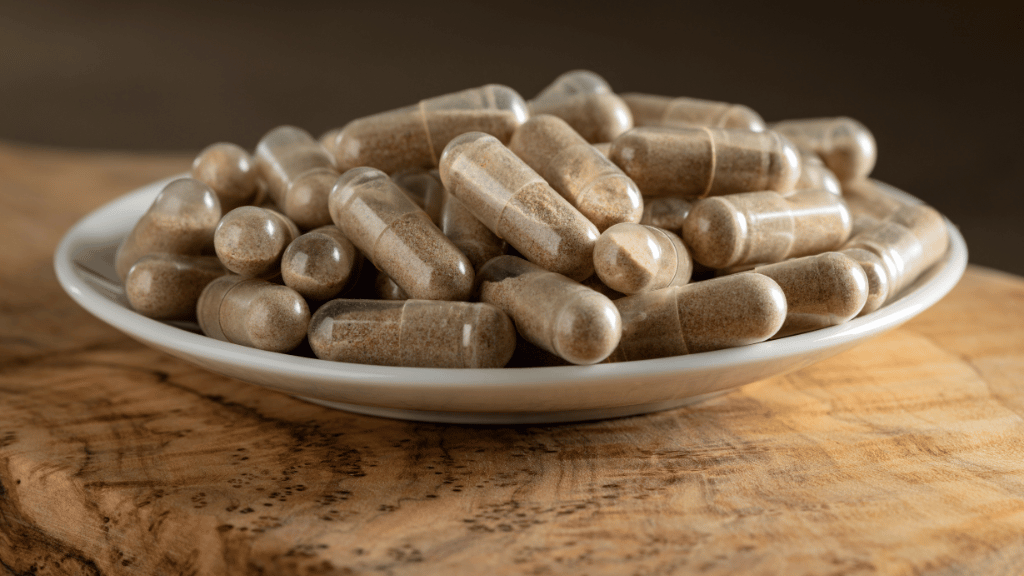
How to microdose mushrooms for pain
Microdosing magic mushrooms for pain requires research on your local laws and regulations, thoughtful sourcing of psychedelic products, and careful tracking of dosage over time.
Always speak to your doctor to better understand how microdosing may affect your current treatment plan, medications, and conditions.
If you've decided to try microdosing for pain management, here are some tips to get started.
How much is a microdose of mushrooms?
The doses are typically about 1/10th to 1/20th of a recreational dose, carefully calibrated to avoid hallucinations or significant alterations in perception.
It's also important to note that you shouldn't microdose mushrooms every single day.
Paul Stamets, a well-known mushroom expert recommends microdosing on a schedule for maximum benefits.
The best microdose dosage for beginners is:
- .1 grams (100mg) dried psychedelic mushrooms
- 500-1000mg of lion’s mane extract
- 100-200mg niacin (b3-vitamin)
To get maximum neurological benefits, Paul recommends combining your microdose with lion's mane extract, a non-psychedelic medicinal mushroom known for it's brain-boosting benefits.
Microdosing for pain schedule
As far as the schedule, Stamets recommends a 4 day on, 3 day off schedule, that would look something like this:
|
Monday |
Tuesday |
Wednesday |
Thursday |
Friday |
Saturday |
Sunday |
|
|
Magic Mushrooms |
100mg |
100mg |
100mg |
100mg |
Off |
Off |
Off |
|
Lion’s Mane |
500- 1000mg |
500- 1000mg |
500- 1000mg |
500- 1000mg |
Off |
Off |
Off |
|
Niacin |
100- 200mg |
100- 200mg |
100- 200mg |
100- 200mg |
Off |
Off |
Off |
Over time, our bodies build up a tolerance. This schedule gives 3 full days of tolerance break to reset and then start back up again.
If you want to learn more about how to get started with microdosing, head on over to our complete guide.
Interested in learning more about the information supporting microdosing for pain management? Here are a few summaries you can explore.
Remember that research about psychedelics and microdosing is extremely limited, so always use caution and loop in your doctor before trying any new therapy or supplement.
Scientific research on microdosing mushrooms for pain
Research on microdosing mushrooms for pain is really quite limited, but there are some reviews and studies you can explore.
We've summarized some of the most prominent ones for you!
(Don't worry, you won't need a medical degree to understand them.)
As always, our team of shroom nerds is here to help answer any questions. But keep in mind that we are not doctors or lawyers. We're just passionate about mushrooms!
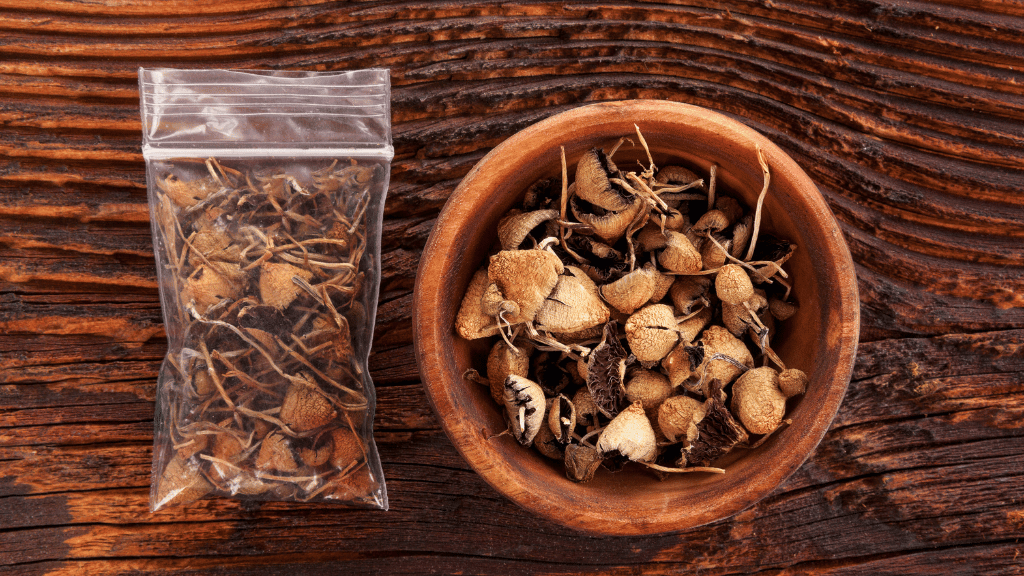
1. Microdosing psilocybin for chronic pain: a case series
This study looks at how psilocybin, a substance found in certain mushrooms, could help people with chronic pain. While high doses of psilocybin combined with therapy have been beneficial for treating depression, anxiety, and addiction, there hasn't been much research on using it for chronic pain, especially at lower doses that don't cause hallucinations.
The study shares stories from three people who used small amounts of psilocybin to successfully manage their chronic pain, improving their lives without needing as many standard painkillers. They didn't experience major side effects or the psychedelic effects often associated with higher doses.
One patient, paralyzed from a spinal injury, experienced significant relief from neuropathic pain in his lower extremities using psilocybin, even reducing his need for other pain medications.
Another patient with complex regional pain syndrome found 80% pain relief for a few hours daily without psychedelic effects using psilocybin.
The third patient, suffering from back pain due to degenerative disc disease, reported complete pain relief lasting up to four weeks after consuming a psilocybin-infused chocolate bar.
These cases highlight the potential of psilocybin to provide pain relief without adverse effects, suggesting the need for further research into optimal dosages and the mechanisms behind psilocybin's effects on chronic pain. Some study authors have affiliations with biotech and pharmaceutical companies.
2. Anti-Inflammatory Effects of Four Psilocybin-Containing Magic Mushroom
This research looked into how certain magic mushrooms that contain psilocybin can help with inflammation, a big issue in many chronic illnesses. Scientists took four types of these mushrooms, made water extracts from them, and then tested these extracts in a lab setting on human immune cells (macrophages) that were artificially inflamed.
They found that, although these extracts weren't great at stopping a specific inflammatory action (15-LOX activity), they were effective at reducing the production of harmful inflammation markers and increasing the survival rate of these immune cells.
Even though they didn't significantly boost the levels of a helpful anti-inflammatory marker (IL-10), the results suggest that these mushroom extracts could reduce inflammation.
This finding is exciting because it supports the idea that these psilocybin-containing mushrooms might have health benefits beyond their well-known psychological effects, specifically in reducing harmful inflammation.
3. Anecdotal Story: Scientific American
Kevin, who has battled with type 1 diabetes, resulting health issues, and later, colon cancer, found unexpected relief in microdosing psilocybin, or magic mushrooms, which improved his mental health and significantly reduced his physical pain without the need for traditional pain medications.
This personal discovery aligns with growing interest among researchers and start-ups in the potential of psychedelics like LSD and psilocybin for treating various types of pain, including chronic pain and fibromyalgia, despite the challenges of limited clinical evidence and the legal status of these substances.
Early research and anecdotal evidence suggest these drugs could offer new pathways for pain management, possibly acting through serotonin receptors and enhancing mood, which plays a crucial role in how pain is perceived and endured.
However, experts caution that more rigorous studies are needed to understand how psychedelics can be safely and effectively used in treating pain, highlighting the importance of considering both the potential benefits and risks.
4. Self-Medication for Chronic Pain Using Classic Psychedelics: A Qualitative Investigation to Inform Future Research
This study focuses on how people with chronic pain have been using psychedelic drugs on their own to find relief. To get ready for a future research trial, researchers talked with 11 people who used these drugs to manage their pain.
They found that after using psychedelics, these individuals reported feeling better both mentally and physically, with less pain. They also used other techniques like mindfulness and breathwork alongside psychedelics.
While these findings are based on personal experiences and can't prove cause and effect, they're helping to shape how the upcoming trial will be conducted.
This initial research suggests that psychedelic therapy could be a promising way to help people with chronic pain in future studies.
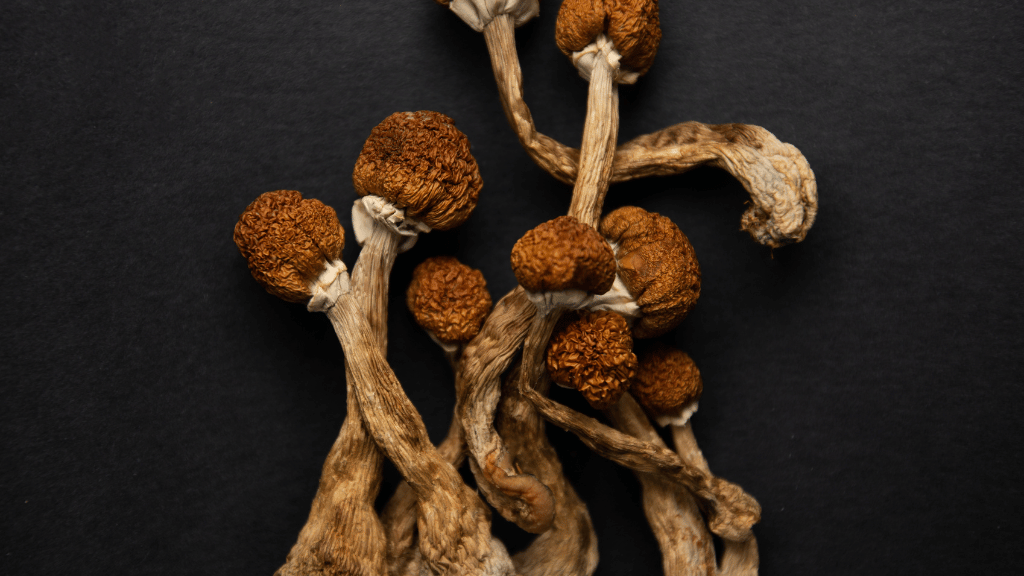
5. Psychedelics Promote Structural and Functional Neural Plasticity
This study found that psychedelics, similar to the drug ketamine, can significantly boost the growth of nerve cells and connections in the prefrontal cortex (PFC) of the brain. The PFC is important for controlling mood, and its weakening is often linked to depression.
The psychedelics studied can increase the number and function of these nerve connections, a change thought to help quickly lift depression.
These effects are likely due to the activation of specific pathways in the brain, known as TrkB, mTOR, and 5-HT2A. This discovery not only highlights the potential of psychedelics to treat depression rapidly and effectively but also points researchers towards specific chemical structures that could be used to create new antidepressant drugs.
These drugs would aim to improve brain plasticity—the brain's ability to change and adapt—offering hope for safe and quick treatments for depression and similar mental health issues.
6. Self-administration of Psilocybin for the Acute Treatment of Migraine: A Case Report
Migraines, a common neurovascular disorder linked to the serotonin system, have shown to be responsive to treatments that modulate serotonin receptors.
A case involving a 33-year-old male experiencing migraines with aura demonstrated that acute oral administration of psilocybin, a psychedelic with activity on serotonin receptors, led to significant reductions in headache intensity and vomiting compared to previous untreated episodes.
This suggests that psilocybin could be a potential therapeutic option for migraines due to its impact on the serotonin system, although further research is needed to confirm its safety and effectiveness for clinical use.
7. Psychoactive substances as a last resort—a qualitative study of self-treatment of migraine and cluster headaches
This qualitative study explored the discussions within online forums by sufferers of treatment-resistant cluster headaches and migraines, aiming to understand their use of alternative pharmacological treatments.
Through thematic analysis of conversations on forums like Shroomery.org, Bluelight.org, and Clusterbusters.org, researchers identified a profound need for effective remedies, leading some individuals to experiment with illicit psychoactive substances, notably psilocybin, lysergic acid diethylamide (LSD), and similar compounds.
This study highlighted the desire to use psychedelics primarily for their potential therapeutic effects rather than their psychoactive properties.
The findings highlight the community's efforts to find relief through unestablished treatments, indicating a preference for sub-psychoactive doses to avoid psychoactive effects, with reported effectiveness in managing symptoms and a focus on reducing risks associated with such alternative treatments.
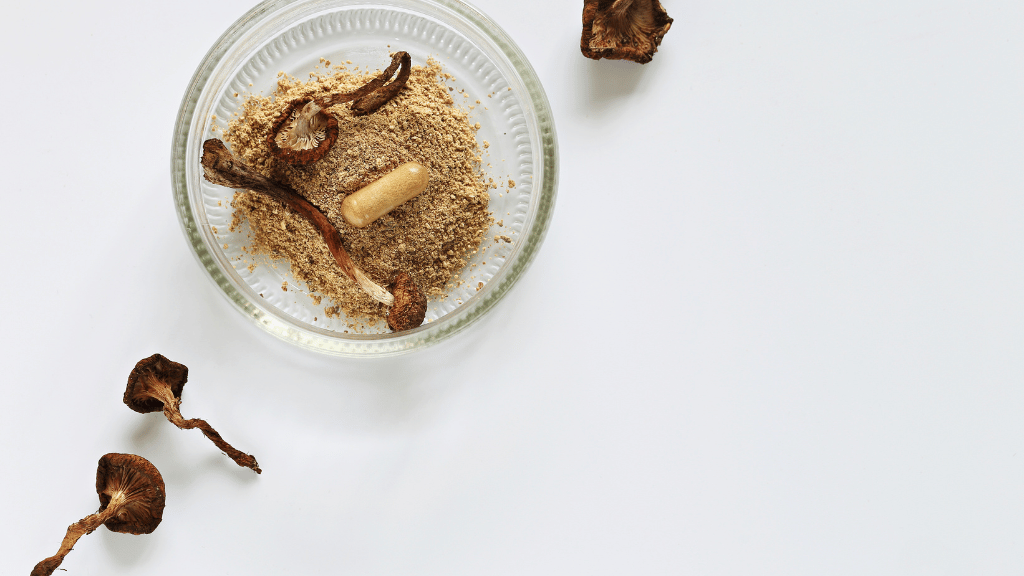
Future research on microdosing for pain
Dr. Maria Maiarù from the University of Reading has been awarded nearly £100K by the Academy of Medical Sciences Springboard Award to advance her research on chronic pain and the potential therapeutic effects of psilocybin, the psychoactive component in magic mushrooms.
This funding, intended to bolster the careers of emerging research leaders, will support studies on animal models to explore how psilocybin might alleviate pain, comparing its effects to those of antidepressants.
The research will include brain imaging to observe psilocybin's impact on brain regions affected by chronic pain, aiming to understand the underlying mechanisms of its potential analgesic properties.
This project underscores a broader commitment to diversifying biomedical and health research, with hopes that Maiarù's work will contribute to developing new pain management strategies and offer insights into psilocybin's role in treating chronic pain conditions.
A note on current research
If you're considering using psychedelics for pain, we really can't stress this enough. The research we included here is limited at best, and almost entirely anecdotal.
Remember: the use of psilocybin is illegal in many parts of the world, and even where it is decriminalized or legalized for medicinal use, it should be used under medical supervision due to potential side effects and the risk of psychological distress.
The good news?
As interest in the therapeutic potential of psychedelics continues to grow, it is likely that more research will emerge, offering clearer insights into how psilocybin and other psychedelic compounds can be used in pain management and other areas of medicine.
Medicinal mushrooms for pain management
If you're looking for non-psychedelic and fully-legal mushroom supplements to support your pain management routine, we've got you covered.
Several medicinal mushrooms have been explored for their potential benefits in pain management, often due to their anti-inflammatory, immunomodulatory, and neuroprotective properties. Here are some notable examples:
Reishi (Ganoderma lucidum)
Known for its anti-inflammatory properties, Reishi can help manage pain by reducing inflammation. It's also used for its calming effects, which may help alleviate stress and improve sleep quality, indirectly supporting pain management.
2. Chaga (Inonotus obliquus)
Chaga has been studied for its antioxidant and anti-inflammatory properties, which may contribute to its potential for pain relief. It’s often used in traditional medicine for various ailments, including reducing inflammation-related pain.
3. Cordyceps (Cordyceps militaris)
This mushroom is known for its energy-boosting and anti-inflammatory effects. While direct evidence of its efficacy in pain management is limited, its overall health benefits might indirectly support pain relief, particularly in cases of fatigue-related discomfort.
4. Lion’s Mane (Hericium erinaceus)
Lion’s Mane has shown promise in nerve regeneration and has neuroprotective properties. Its potential to support nerve growth and repair may make it useful in managing neuropathic pain and improving cognitive function.
5. Turkey Tail (Trametes versicolor)
While primarily known for its immune-boosting properties, Turkey Tail contains compounds that may help modulate the immune system and reduce inflammation, potentially aiding in the management of pain.

6. Shiitake (Lentinula edodes)
Shiitake mushrooms are rich in compounds that may support immune health and reduce inflammation, which could contribute to pain relief in inflammatory conditions.

Sources so you can keep exploring:
Akash Goel, Yeshith Rai, Shayan Sivadas, Calvin Diep, Hance Clarke, Harsha Shanthanna, Karim S. Ladha; Use of Psychedelics for Pain: A Scoping Review. Anesthesiology 2023; 139:523–536 doi: https://doi.org/10.1097/ALN.0000000000004673
Lyes M, Yang KH, Castellanos J, Furnish T. Microdosing psilocybin for chronic pain: a case series. Pain. 2023 Apr 1;164(4):698-702. doi: 10.1097/j.pain.0000000000002778. Epub 2022 Sep 5. PMID: 36066961.
Scientific American. "Can Psychedelic Drugs Treat Physical Pain?" Scientific American, 2021 Sep 30. https://www.scientificamerican.com/article/can-psychedelic-drugs-treat-physical-pain/.
Bornemann J, Close JB, Spriggs MJ, Carhart-Harris R, Roseman L. Self-Medication for Chronic Pain Using Classic Psychedelics: A Qualitative Investigation to Inform Future Research. Front Psychiatry. 2021 Nov 12;12:735427. doi: 10.3389/fpsyt.2021.735427. PMID: 34867525; PMCID: PMC8632941.
Clinical Pain Advisor. (n.d.). Microdosing of Psilocybin May Be Effective for Chronic Neuropathic Pain. Retrieved 2024 Mar 4, from https://www.clinicalpainadvisor.com/neuropathic-pain/microdosing-of-psilocybin-may-be-effective-for-chronic-neuropathic-pain/
Ly C, Greb AC, Cameron LP, Wong JM, Barragan EV, Wilson PC, Burbach KF, Soltanzadeh Zarandi S, Sood A, Paddy MR, Duim WC, Dennis MY, McAllister AK, Ori-McKenney KM, Gray JA, Olson DE. Psychedelics Promote Structural and Functional Neural Plasticity. Cell Rep. 2018 Jun 12;23(11):3170-3182. doi: 10.1016/j.celrep.2018.05.022. PMID: 29898390; PMCID: PMC6082376.
Anderson, T., Petranker, R., Christopher, A. et al. Psychedelic microdosing benefits and challenges: an empirical codebook. Harm Reduct J 16, 43 (2019). https://doi.org/10.1186/s12954-019-0308-4
Andersson M, Persson M, Kjellgren A. Psychoactive substances as a last resort-a qualitative study of self-treatment of migraine and cluster headaches. Harm Reduct J. 2017 Sep 5;14(1):60. doi: 10.1186/s12954-017-0186-6. PMID: 28870224; PMCID: PMC5584001.





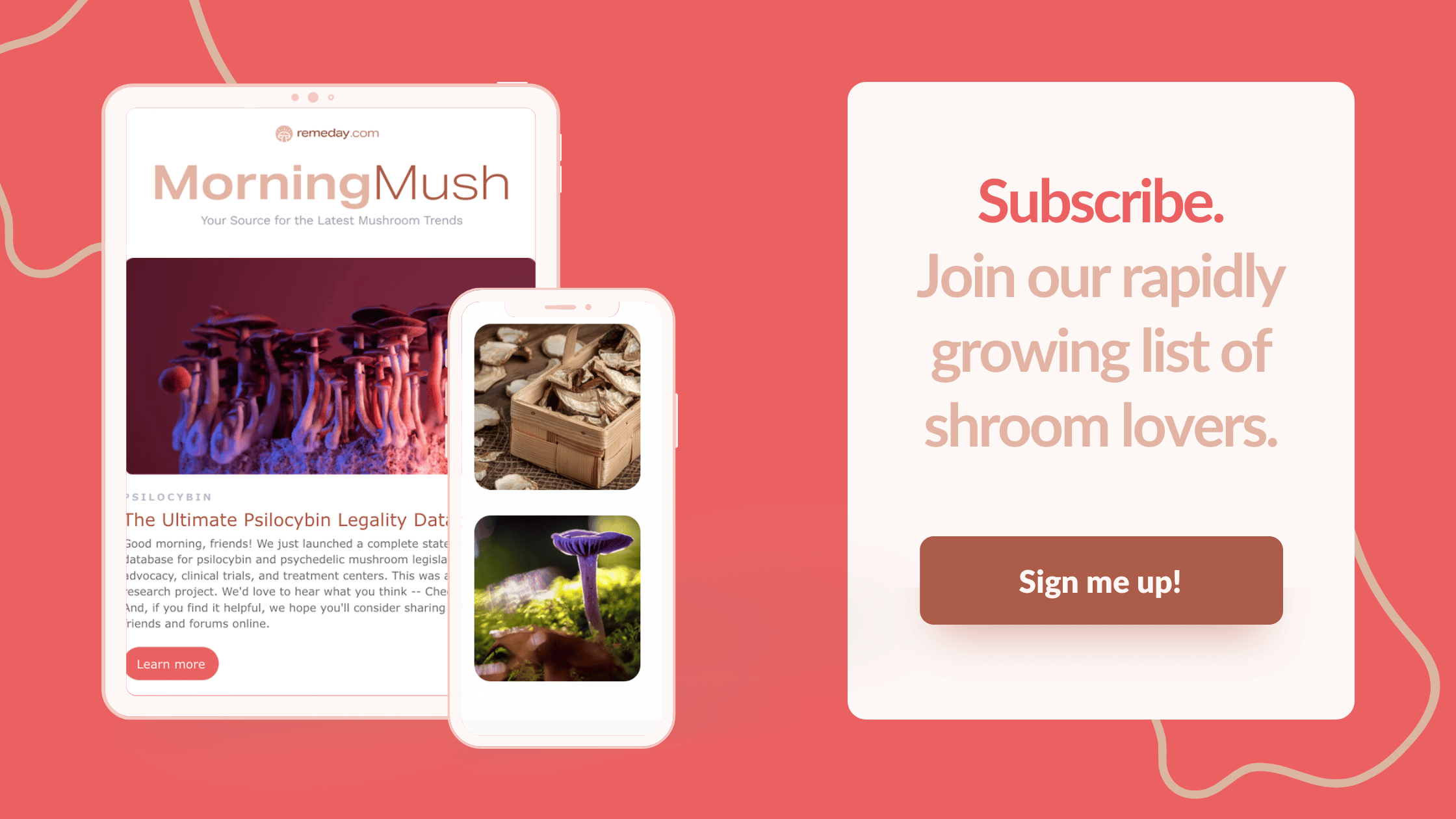
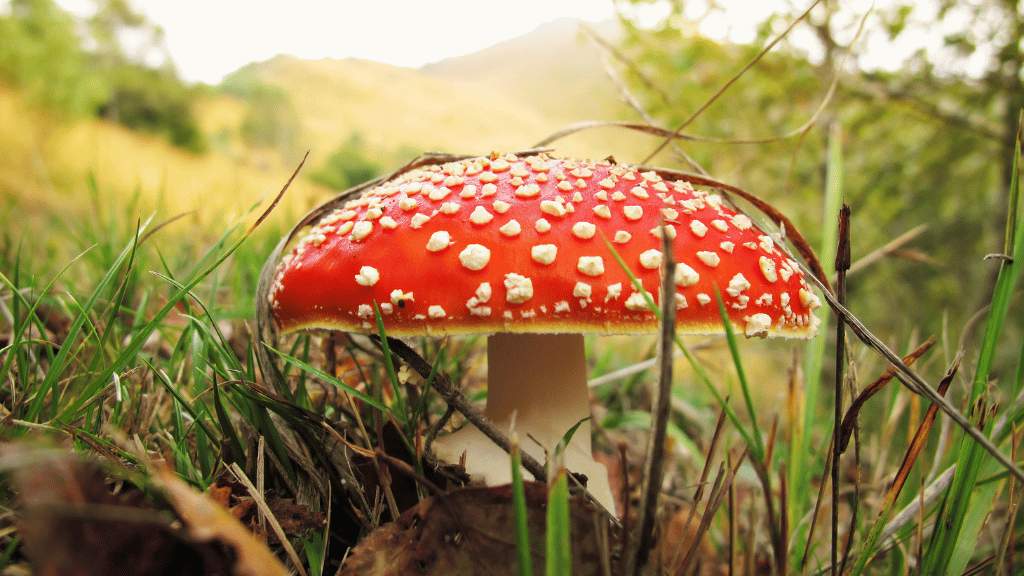


.png)
